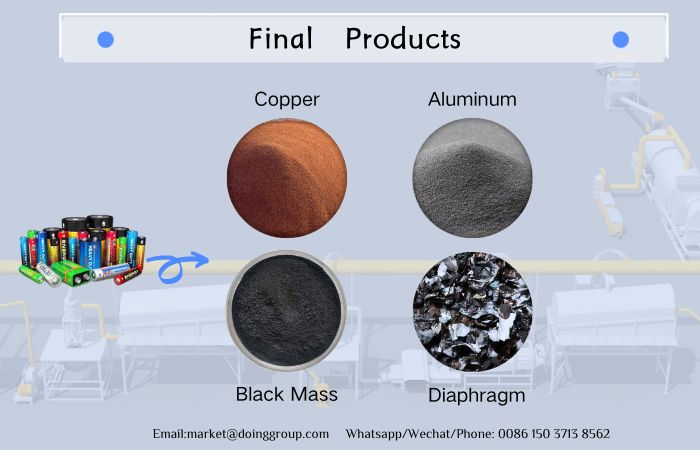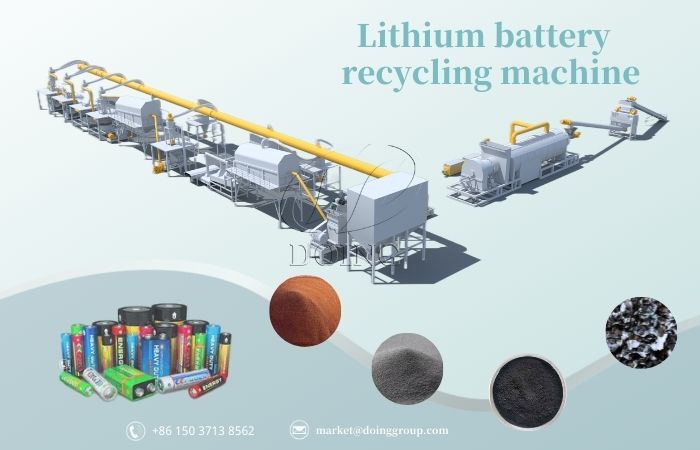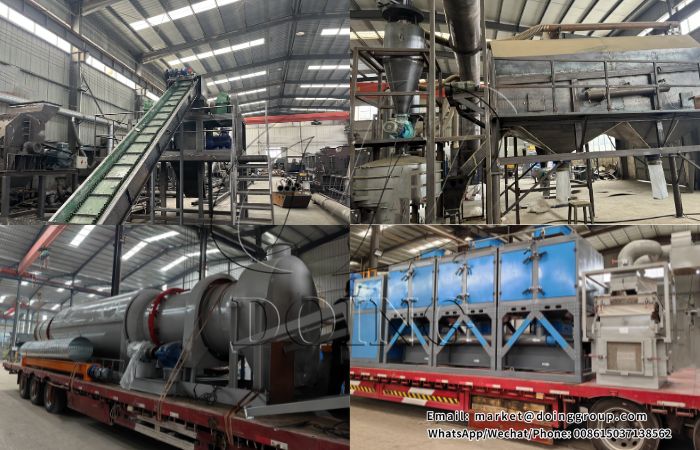 WhatsApp
WhatsApp

DOING HOLDINGS
Henan Doing Environmental Protection Technology Co., Ltd
E waste recycling machine manufacturer
- WhatsApp: +86 150 3713 8562
- Email: market@doinggroup.com
Why are more and more people doing waste lithium battery recycling business?
 September 12, 2024
September 12, 2024- FAQ
- Leave a message
- Chat online
As the world becomes increasingly reliant on portable electronic devices and electric vehicles, the demand for rechargeable lithium-ion batteries has skyrocketed. This surge in usage has led to a corresponding increase in end-of-life batteries, creating both a challenge and an opportunity for sustainable resource management. The rise in the number of individuals and businesses engaging in waste lithium battery recycling can be attributed to a confluence of factors, reflecting not only economic incentives but also environmental consciousness and regulatory pressures.
Environmental Imperatives
At the heart of the matter lies the pressing need to address the environmental impact of battery disposal. Lithium-ion batteries contain heavy metals and toxic chemicals such as cobalt, nickel, and lithium, which, if not managed properly, can contaminate soil and groundwater, posing severe risks to ecosystems and human health. Recycling these batteries prevents hazardous substances from entering the environment, reducing pollution and preserving natural resources.
Moreover, the extraction and processing of raw materials used in battery production, particularly cobalt and lithium, have been associated with ecological damage and some social problems. By recycling lithium-ion batteries, we can reduce the dependency on primary resource extraction, thereby mitigating these negative externalities.
Economic Incentives
Economic factors also play a crucial role in the growth of the waste lithium battery recycling industry. Lithium-ion batteries are rich in valuable materials. Recycling them offers a secondary source of these commodities, reducing the reliance on costly and often geopolitically unstable primary markets. As global demand for lithium and other battery metals continues to grow, so does their market value, making the recovery of these materials economically attractive.
 Products of lithium battery recycling machine
Products of lithium battery recycling machine
Through advanced equipment such as lithium battery recycling machine and metal purification equipment, recycling companies can recover up to 95% of the materials found in lithium-ion batteries, including lithium, cobalt, nickel, and copper, which can then be sold back into the manufacturing supply chain. This closed-loop system not only generates revenue but also stabilizes the supply of critical battery materials, reducing price volatility and enhancing the overall sustainability of the battery industry.
Technological Advancements
Advancements in recycling technology have made the process more efficient and cost-effective, further fueling the expansion of the waste lithium battery recycling sector. Traditional smelting methods, while effective at recovering some metals, were energy-intensive and emitted greenhouse gases. However, new hydrometallurgical and pyrometallurgical techniques, along with mechanical separation processes, have significantly improved recovery rates while minimizing environmental harm.
 Lithium battery recycling machine
Lithium battery recycling machine
Henan DOING is a high-tech enterprise focusing on the research, development, production and sales of waste lithium battery recycling machine. Our lithium battery recycling machine integrates a series of professional equipment and technologies, including crushing, pyrolysis, de-powdering and sorting equipment, waste treatment system, etc., providing an efficient and environmentally friendly solution for the resource recycling of waste lithium batteries.
 Lithium battery recycling machine
Lithium battery recycling machine
In addition, our lithium battery recycling machine also has a high degree of automation and intelligence. Through the integrated control system, the equipment realizes real-time monitoring and intelligent adjustment of the recycling process, improving production efficiency and recycling quality. At the same time, lithium battery recycling machine from our factory is easy to operate and has low maintenance costs, bringing significant economic benefits to users.
Regulatory Frameworks
Regulatory pressures and policy incentives have played a pivotal role in promoting waste lithium battery recycling. Many countries are implementing stricter regulations around battery disposal, mandating recycling targets and prohibiting the landfilling or incineration of lithium-ion batteries. For instance, the European Union’s Battery Directive and China’s policies on battery waste management set clear guidelines for collection, recycling, and the responsible disposal of batteries.
Governments are also offering financial incentives, subsidies, and tax credits to encourage recycling activities. Such policies create a favorable environment for the growth of the recycling industry by offsetting initial investment costs and enhancing the economic viability of recycling operations.
Henan DOING has a team of highly qualified engineers and professional factories that can customize lithium battery recycling equipment for you based on your needs. If you are interested in the lithium battery recycling industry and would like to learn more details about lithium battery recycling machine, please feel free to contact us.
Contact Us
- Email:
- Tel/WhatsApp:
News

DOING 100-150kg/h PCB Recycling Machine Shipped to Zambia, Powering Local E-Waste Automation

DOING 5-ton/hour biomass carbonization machine shipped to Ghana

Indian customer ordered DOING high-recovery-rate 1000 kg/h photovoltaic panel recycling machine


Process Workflow and Equipment for Lithium Battery Recycling
Contact Us
If you want to get more details, you can send E-mail to market@doinggroup.com. Or you can consult our professional engineers and specialized sales team by leaving a message in below form. We will contact you ASAP.






